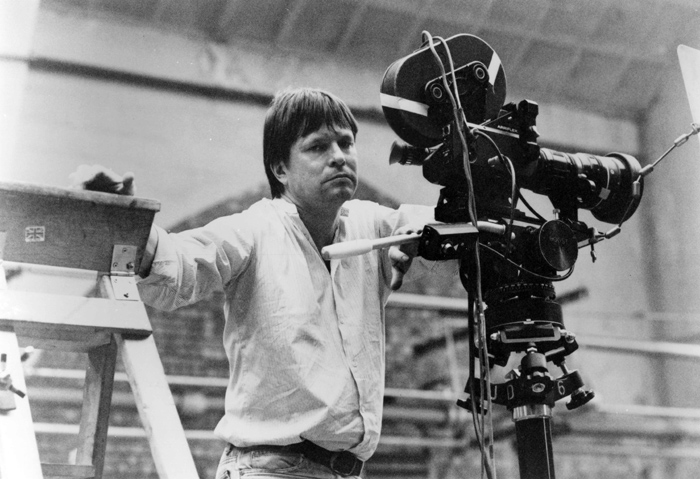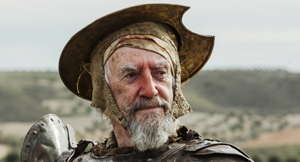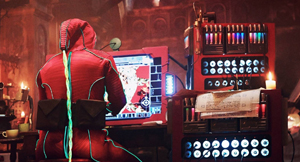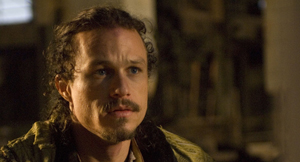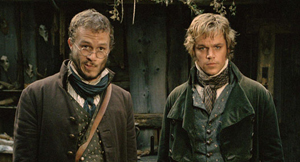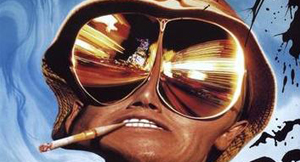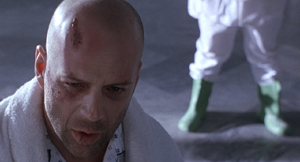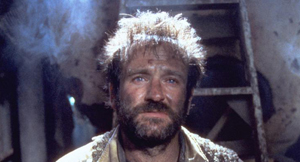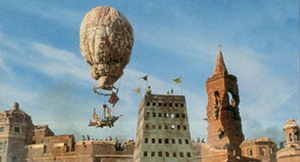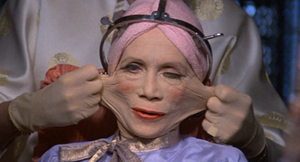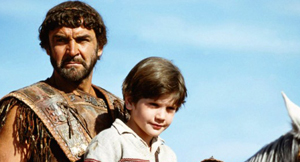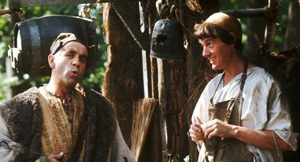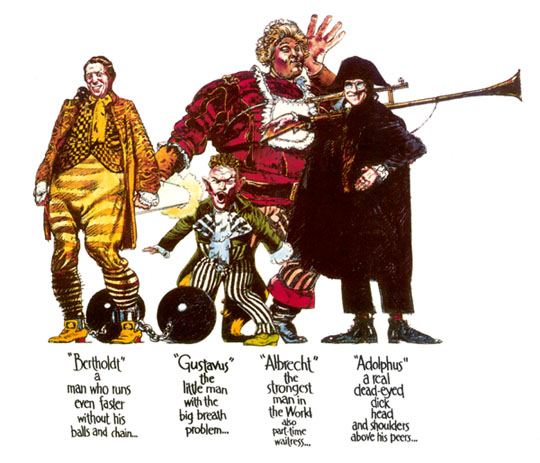
Close Personal Friends of Baron Munchausen, an image from the UK publicity for Munchausen
Introduction
Here are just a few of the things that Terry Gilliam said about his film The Adventures of Baron Munchausen:
- “The clash between the baroque and the Newtonian view of the world is my message in a bottle. Films are like flares fired from a lifeboat to see if anyone else is out there.”
- “I always identify with my lead characters. I was Sam in Brazil. ‘What will become of the Baron? Surely this time he will not escape’ began as the movie’s theme tune. It soon became mine.”
- “I think my priorities are right. I will sacrifice myself or anyone else for the movie. It will last. We’ll all be dust.”
Also, Eric Idle (a Python colleague) said:
- “Up until Munchausen, I’d always been very smart about Terry Gilliam films. You don’t ever be in them. Go and see them by all means – but to be in them, fucking madness!!!“
The Adventures of Baron Munchausen is a unique fantasy film, and has been underrated by many, for many years. It boasts excellent visuals, some wonderful performances – and of course Terry Gilliam’s own inimitable style is stamped all over it. And, as with other Terry Gilliam films, the behind-the-scenes stories about its production and release are almost as interesting as the movie itself.
Munchausen Links within Dreams…
The Production of Munchausen
Read about some of its problems
Flights of Fancy
An essay about Munchausen by JD Lafrance
The Big Picture
Gilliam interview upon the release of Munchausen
Munchausen Links external to Dreams…
Munchausen at the imdb
A full, cross referenced list of Munchausen credits
Film Finances Inc
Find out more about the folks who were Munchausen‘s completion guarantor.
Belchite Images
One of the locations for the filming of Munchausen was the town of Belchite, situated near Zaragoza in Spain. The town was destroyed during the Spanish Civil War in 1936, but many damaged buildings still remain. Below are some images from the town:
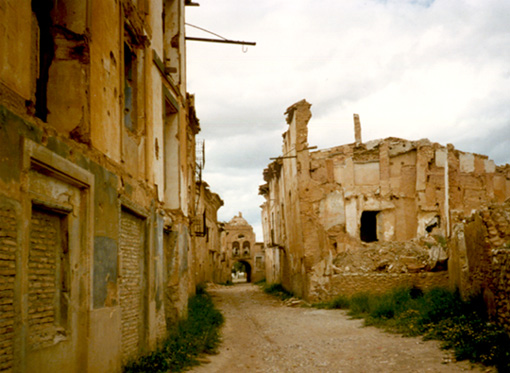
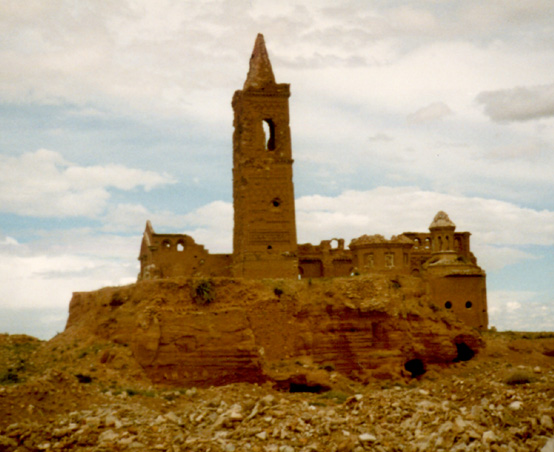
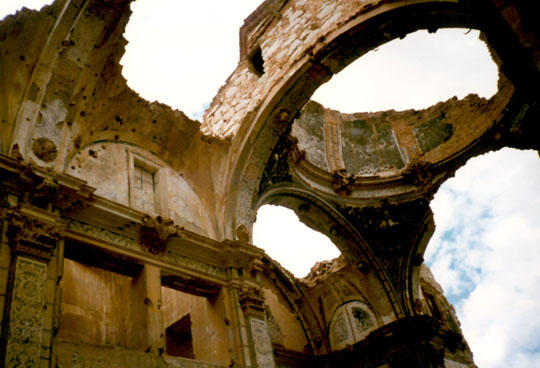
Plot
In the 19th century, a fortress is under siege from the Turkish Army. While the attack is going on, the town’s people are in the theatre, watching a play based on the life of notorious tall tale teller Baron Munchausen.
The real Baron Munchausen arrives at the theatre and claims not only to have started the war, but also to be able to save the town from the siege. He encounters only mockery from an incredulous townsfolk who dismiss the Baron and his stories.
The Baron finds an ally, a young girl called Sally, who encourages the Baron to imagine a method to save the city – this involves the Baron locating his four powerful friends by flying to the moon and visiting war god Vulcan under a mountain (where he encounters the pictured Cyclops). He is also swallowed by a large sea monster. The Baron’s friends are Bertholdt, who can run faster than a bullet; Albrecht, who is very strong; Adolphus, who can see for miles; and Gustavus who can blow faster than a thousand winds. However, his friends have aged somewhat, and appear reluctant to go into battle. Reunited with his friends, the Baron aims to save the city from the Sultan and his army. But can any of this actually have happened?

Background
Baron Karl Friedrich Hieronymous von Munchausen did actually exist in the eighteenth century. Rudolph Raspe compiled a collection of his apochryphal stories in 1785, which have enchanted children for generations. The stories were later illustrated by Gustave Dore.
Who lured Terry Gilliam into making Munchausen the movie? In 1979, George Harrison showed Gilliam his collection of Munchausen stories, and later, Ray Cooper gave Gilliam a book on the Baron and challenged the director to make a film of them.
On the completion of Brazil in the mid-eighties, Munchausen seemed like an ideal project. It would be visually rich, and would have an appeal similar to the hugely profitable Time Bandits. The more the idea was developed, the more it became apparent that such a movie would in fact be the third part of a trilogy, starting with Time Bandits (fantasist as child), Brazil (young man), and now Munchausen (old man).
Following a collaboration on Brazil, Gilliam developed Munchausen with Charles McKeown. At the time, Arnon Milchan was interested in producing the movie. However, the movie was produced by Thomas Schuhly, a German producer based at Rome studio Cinecitta. According to Schuhly, Milchan was impressed that he had produced The Name of the Rose under budget, and asked Schuhly if he would like to produce Munchausen, with Milchan as executive producer. Gilliam loved the idea of making Munchausen in Rome, and got on well with Schuhly when they met. At this time, Milchan became less and less interested in Munchausen, and as a result, bowed out. Schuhly took on the full role of producer. The script was developed and according to Schuhly’s insistence, was budgetted at $25m. It was assumed that production costs at Cinecitta would be far below that of London.
A deal was struck with Columbia, then with David Puttnam in charge, giving the company distribution rights for most of the world. Columbia was to pay $25m, which included video distribution rights too. Since Columbia would pay no more than this amount, a completion guarantor was employed, to insure against the movie going over budget. At this stage, Gilliam’s previous two films were Time Bandits and Brazil, and Gilliam had a reputation, thanks in part to his modelling skills, for being able to deliver expensive looking films cheaply. It turned out that the agreed budget would prove to be woefully inadequate.
Cast and Crew
Gilliam was delighted to work in Italy, and Schuhly helped to get an excellent crew for Terry. The Production Designer was Dante Ferretti, and the Director of Photography was Giuseppe Rotunno, both of whom had worked with Fellini. Ferretti compares Gilliam to Fellini, “Terry is very similar to Fellini in spirit. Fellini is a wilder liar, but that’s the only difference! Terry isn’t a director so much as a film author. He is open to every single idea and opportunity to make the end result work. Often the best ideas have come out of something not working properly and coming up with a new concept as a result. He is very elastic and that’s one quality in a director that I admire the most.” Richard Conway, who had worked for Brazil, was responsible for special effects.
As in his previous movies, Gilliam used excellent character actors in Munchausen. The role of the Baron was filled by John Neville – not very well known, but Gilliam felt he would fit the role of the Baron far better than other established stars. Michael Hordern was also considered in the early stages of development, but said to Gilliam, “Look Terry, I’m 73 – and I’d very much like to see 74!”. Bertholdt was played by Eric Idle, a fellow ex-Python, who has worked with Gilliam over the years on many projects. Gilliam was particularly pleased with Vulcan, played by Oliver Reed as a steel baron from Nineteenth Century Lancashire. Reed recalled, “Munchausen was about the only time I’ve been allowed to do what I wanted with a part. You can be over-directed by people, but Terry let me have my own way. [When rehearsing], Terry said, ‘You seemed to be having much more fun with the character yesterday. Could you take it a bit further?’ I didn’t need to be told twice! Once I realised I could get away with it, off I went!”


